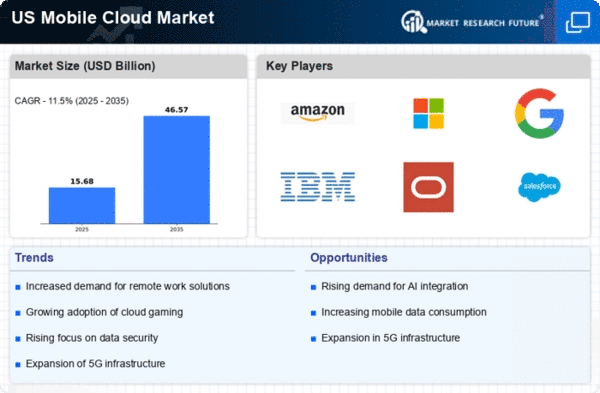Emergence of Edge Computing
The emergence of edge computing is poised to transform the mobile cloud market by enabling faster data processing and reduced latency. As more devices become interconnected, the need for efficient data handling at the edge of the network is becoming increasingly apparent. This trend is particularly relevant in sectors such as healthcare and manufacturing, where real-time data processing is critical. Reports indicate that the edge computing market is expected to grow at a CAGR of over 30% in the coming years, which could significantly influence the mobile cloud market. By integrating edge computing capabilities, mobile cloud providers can offer enhanced services that meet the demands of latency-sensitive applications. This development may lead to a more dynamic and responsive mobile cloud market, as businesses seek to leverage the benefits of edge computing.
Growing Focus on Data Analytics
The mobile cloud market is witnessing a growing focus on data analytics, which is becoming increasingly vital for businesses seeking to leverage their data for strategic decision-making. Organizations are recognizing the importance of real-time insights derived from cloud-based analytics tools. In fact, a recent survey indicated that over 60% of US enterprises are investing in mobile cloud solutions that incorporate advanced analytics capabilities. This trend suggests that companies are not only looking for storage solutions but also for platforms that can provide actionable insights. As a result, the mobile cloud market is likely to evolve, with providers enhancing their analytics offerings to cater to this demand. The ability to analyze data on-the-go is expected to empower businesses to make informed decisions, thereby driving growth in the mobile cloud market.
Rising Demand for Remote Work Solutions
The The mobile cloud market is experiencing a notable surge in demand for remote work solutions. is experiencing a notable surge in demand for remote work solutions. As organizations increasingly adopt flexible work arrangements, the need for cloud-based applications that facilitate collaboration and communication has intensified. According to recent data, approximately 70% of companies in the US have implemented or are planning to implement mobile cloud solutions to support their remote workforce. This trend is likely to drive innovation in the mobile cloud market, as providers enhance their offerings to meet the evolving needs of businesses. The integration of mobile cloud technologies allows employees to access critical applications and data from anywhere, thereby improving productivity and operational efficiency. Consequently, this driver is expected to significantly influence the mobile cloud market, as companies prioritize solutions that enable seamless remote work capabilities.
Regulatory Compliance and Data Governance
The mobile cloud market is increasingly shaped by the need for regulatory compliance and data governance. As data privacy regulations become more stringent, organizations are compelled to adopt mobile cloud solutions that ensure compliance with laws such as the GDPR and CCPA. A significant portion of US companies, approximately 55%, report that compliance requirements are a primary driver for their investment in mobile cloud technologies. This trend indicates that businesses are prioritizing solutions that not only provide storage and processing capabilities but also adhere to regulatory standards. Consequently, mobile cloud providers are likely to enhance their offerings to include robust compliance features, thereby influencing the overall landscape of the mobile cloud market. This driver underscores the importance of trust and security in the adoption of mobile cloud solutions.
Increased Investment in Cloud Infrastructure
The mobile cloud market is benefiting from increased investment in cloud infrastructure, as organizations recognize the need for robust and scalable solutions. In the US, cloud spending has seen a substantial rise, with estimates suggesting that it could reach $100 billion by 2026. This influx of capital is likely to enhance the capabilities of mobile cloud services, allowing providers to offer more reliable and efficient solutions. As businesses migrate to cloud-based platforms, the demand for mobile cloud services is expected to grow, driven by the need for improved performance and security. Furthermore, the expansion of 5G technology is anticipated to further bolster this investment, as it enables faster and more reliable mobile connectivity. Consequently, this driver is poised to have a significant impact on the mobile cloud market.
















